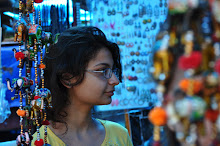The other day, I heard about this young male journalist who works in Vidarbha. His mother told me. She's in town; her kidneys are in protest mode.
A couple of farms a few districts away are low on men this month. One of the MIA farmers is 25. Some valves in his heart need attention.
One go-to kirana store in a Nanded neighbourhood is unmanned these days. The owner can undergo necessary surgery only half a state away.
Almost everyday now, we make our way through wards full of occupied beds. Males, females. Ages 12 and above.
Youngsters, and then some who could be their grandparents. Parents who have long avoided hospitalisation because their kids would then be alone at home, without help. Middle aged men and middle aged women, with their middle aged siblings and relatives in attendance. There are teenagers, unmindful of the gravity of their stay at the hospital; their parents stand by and overcompensate.
The entire spectrum of backgrounds, moods, conditions, support and coping mechanisms, brought together on a floor partitioned a few times over.
Man hours slip by without hesitation, and daily wagers, with their implicit faith in our badgeless white aprons, ask how soon they can return to work.
Human lives, all with their own intricately detailed stories, surround us in those wards. And all we're equipped to do right now is record patients' histories. Onset, progression, duration. Aggravating factors. Relieving factors.
To talk, in a clear, friendly and systematic manner. Work out a provisional diagnosis. Tell yourself that you're quite the stud. Rinse and repeat.
The human angle kicks you in the face when you walk past a patient later that day, or the following day, no longer in need of their account of their illness.
When you choose to slow down to nod, to smile, to ask how they're doing. To ask if they've eaten, if the doctor has been to see them today. To ask that ailing teenager's mother if he has been troubling her too much.
And out of nowhere, with a gesture as small and commonplace as that, you watch as eyes light up - you discover that it's not just a figure of speech. Smiles split open resting faces, even faces of those who launch into a series of complaints right after. A cheeky grin sometimes puts in an appearance and you're struck by how right and happy it looks.
Who would believe this person has a file full of grim reports?
You grin back. Figure you're probably at the happiest bed in the ward. Then grin a little more because, well, you had something to do with it and modesty must not come in the way of wide grins.
Continue on your way, feeling like a total stud. Acknowledge that the patients and their relatives are studlier still, for giving you that moment.
Why, you'll be invincible once you can truly fix the cause behind patients' complaints.
Invincible and intolerable.





0 comments:
Post a Comment